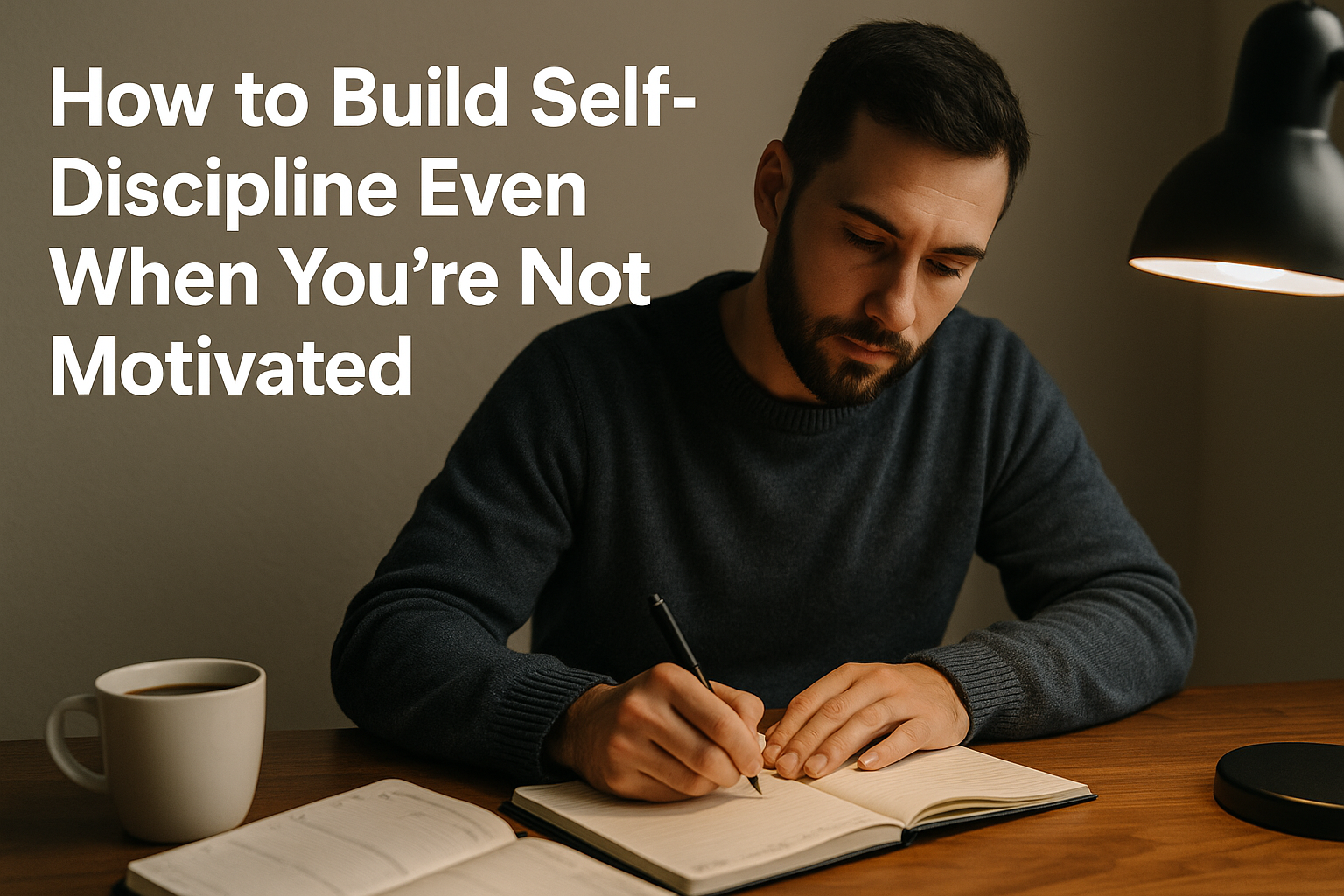Motivation comes and goes. One day, you’re ready to conquer the world; the next, you can’t get out of bed. That’s why learning how to build self-discipline even when you’re not motivated is one of the most powerful skills you can develop in your personal growth journey.
While motivation may start the engine, self-discipline is what keeps the car moving—even when the road is uphill. The good news is: you don’t have to be born with discipline. You can train it like a muscle.
In this article, we’ll explore practical ways to stay committed to your goals even when you’re tired, distracted, or feeling “off.”
Why Self-Discipline Matters More Than Motivation
Motivation is emotional and fleeting. It depends on mood, energy levels, and external inspiration. Self-discipline, however, is a decision, a choice to act in alignment with your values regardless of how you feel in the moment.
H2 – The Power of Discipline Over Emotion
- Helps you follow through with habits and goals
- Builds trust in yourself
- Reduces procrastination and impulsiveness
- Creates long-term success, not just short bursts of action
1. Start With Your “Why”
When you’re low on motivation, your reason for starting is your anchor. Whether it’s health, financial freedom, career success, or personal peace—clarity fuels commitment.
H2 – Connect With Your Purpose to Stay Consistent
Write down:
- Why this goal matters
- Who benefits if you stay disciplined
- What’s at stake if you give up
Revisit this list daily or during moments of doubt.
2. Create a Simple, Repeatable Routine
Discipline thrives on routine. You don’t need a complicated plan—you need one that’s easy to stick to, especially on hard days.
H2 – Routines That Support Discipline Without Motivation
- Schedule your key task at the same time each day
- Pair habits with existing behaviors (e.g., write after coffee)
- Keep tasks small and specific to avoid resistance
A repeatable routine minimizes decision fatigue and builds consistency.
3. Use the “5-Minute Rule”
On days you feel stuck, promise to do the task for just five minutes. Often, starting is the hardest part.
H2 – How to Build Momentum With Micro-Commitments
Examples:
- Open your laptop and write one sentence
- Put on workout clothes and stretch for five minutes
- Read one paragraph of that book
Five minutes can turn into twenty. But even if it doesn’t, you win by showing up.
4. Track Your Progress (Visibly)
Tracking gives your brain proof that you’re building discipline. Use a habit tracker, journal, or simple calendar to check off daily wins.
H2 – Build Discipline Through Visible Progress
Seeing a chain of effort (even imperfect effort) builds pride and motivates future consistency.
5. Remove Friction and Distractions
Make your environment work for you, not against you. The fewer steps it takes to start, the more likely you are to follow through.
H2 – Designing Environments That Support Discipline
- Keep your tools and resources ready (planner, gym shoes, meal prep)
- Silence notifications or use app blockers
- Create a designated workspace free from clutter
Your surroundings influence your discipline more than you realize.
6. Embrace Imperfect Action
Waiting to feel “ready” or for the perfect moment is the enemy of discipline. The truth? You won’t always feel like it. Do it anyway.
H2 – Why Imperfect Discipline Beats Perfect Intentions
Success comes from repeatedly showing up—not from waiting to feel inspired.
7. Reward Yourself Strategically
Positive reinforcement helps your brain associate discipline with pleasure, not punishment.
H2 – How Rewards Strengthen Your Self-Discipline Habit
- Enjoy a short break after a focused work session
- Celebrate a full week of consistency with a treat
- Share your progress with someone who supports you
Small wins deserve recognition. They keep the cycle of action going.
8. Surround Yourself With Accountability
Discipline grows faster when you don’t go it alone. Find someone who can support your goals or join a group with similar habits.
H2 – Accountability Systems That Keep You Committed
- Use a habit tracking app with a friend
- Join a challenge or online community
- Tell someone your weekly goal and follow up
External support strengthens internal discipline.
Final Thoughts: Discipline Is a Skill, Not a Trait
Building self-discipline—even when you’re not motivated—is a process. It’s not about being strict or rigid. It’s about choosing progress over perfection, action over delay.
Start small. Be consistent. Forgive the off days. And above all, trust that every disciplined choice brings you closer to the person you want to become.
Remember: you’re not always going to feel like it—but you can do it anyway.

